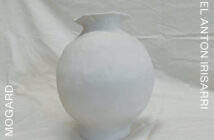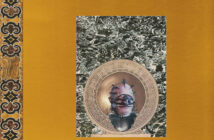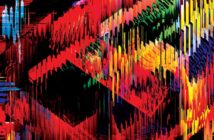
Since 1996, German Jens Massel has created disturbing soundtracks as Senking. The Cologne native’s latest release, Capsize Discovery continues in this vein, providing listeners with a darkly dubby work that sounds custom-made for Ballardian overpasses and Brutalist architecture.
The album’s key air is one of pervasive gloom. It’s the sort of deep languor that populated the darker moments of Orbital’s In Sides but with a more fatalistic cast. The album behaves as a diving bell, transporting the listener to more fragmented, worrisome parts of the human psyche, with the label claiming that the album reflects difficult situations – and the problem of freeing oneself from them.
Opener ‘Chainsawfish’ sets the scene nicely: a bed of bass drone, sonar-styled pings and a heavy synth presence. A shaker sound leads the way to what sounds like drums in an enormous reverberant space, while occasional vocal snippets fade in and out. It’s as if Jaws were soundtracked in an echo chamber by a paranoid, and ends with white-noise howling winds.
It’s unsurprising that Massel lists Blade Runner as one of his influences. There’s a distinct sense of the city through these tracks, though they do feel like an empty (rather than thriving) metropolis. Each track mines some element of the abandoned city: indeed, the title track sounds as if it were recorded in a vacant car park, albeit with the addition of the stone-throwing heard in The Blair Witch Project.
The most masterful track of the album is ‘Tiefenstop’. It brings The Terminator to mind, with a sort of pregnant awfulness hiding throughout. The by-now familiar bass bed rears and fizzes, while hand percussion offers some human shadings. In the background, the sound of children whispering, pleading. A distinctly Orbital-sounding pair of synths play high in the mix, and the feeling is of movement – that we have to move now. Or else.
Of course, if it were wholly relentless, this album would be unbearable. Instead, it seems to skirt hopeless despair and – by way of the analogue warmth conveyed by a richly overdriven warbling bass, something one might find on a Klaus Schulze disc – relays some kind of narcotic warmth. For all the strangeness, there are moments (the Peter Gabriel-style keys on ‘Cornered’, the tones floating above the dark bed of ‘Nightbeach’) of real beauty.
Disappointingly, the album’s close isn’t as powerful as what’s come before. With no track under five minutes, endurance begins to flag by the time second-last track ‘Murders’ arrived. It’s not a bad track, it just seems to mine the by-now familiar vein without much spark. Closer ‘Endurobones’ seems a little too much like an outtake from an “edgy” action movie soundtrack, though, and breaks the urban meditative state encouraged by the rest of the album. It’s not absolutely terrible, but it’s certainly not up to the high level of paranoia found elsewhere.
The most astonishing feature of this disc – consisting of so many electric, fluid, heavily-reverbed sounds – is that it was not performed on a computer. We’re told Massel creates his work without them, so despite some pacing problems, it’s a wonderfully creepy tribute to his realtime knob-twiddling.
LUKE MARTIN



